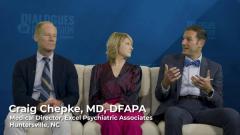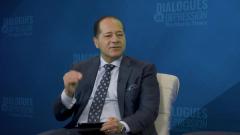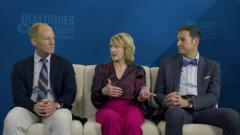
Final Pearls: Changing Possibilities in MDD Management
Clinicians wrap up their discussion on novel, rapid-acting agents for major depressive disorder (MDD) with key insights and takeaways for providers.
Episodes in this series

Transcript
Gus Alva, MD, DFAPA: Any other thoughts regarding the themes that we’ve been touching on or these clinical cases that might be useful for our audience?
Erin Crown, MHS, PA-C: I would just like to say to clinicians out there, whether they’re MD, DO, PA [physician assistant], nurse practitioner, I think it’s important for us to really wrap our heads around [how] mechanism of action [MOA] matters. We really need to understand more about it as practicing clinicians and stop treating to indication and start paying attention to the individuals that we’re serving. We have a lot of information available now to help us do that. And so MOA matters, it’s time to pay attention.
Craig Chepke, MD, DFAPA: And to build off of that, one reason that matters is also that it lets us, as Greg says, prescribe with hope. And [I] have had so many patients [where] I’ve told them about the MOA of the medication I’m prescribing, and that’s why I’m choosing it for them specifically. And they are so appreciative that they say, “Thank you so much. No other provider has ever explained why they picked the medication. It just felt like they were throwing darts.” That type of hopefulness is really important for them. But if we can’t articulate that information about the MOA and do it in a way that our patients can understand, we can’t give them that hope and pass it on and kindle that spark. So that’s one thing. And then also that we just need to, as clinicians, keep fighting because it makes sense why sometimes patients get put on different SSRIs [selective serotonin reuptake inhibitors] and SNRIs [serotonin-norepinephrine reuptake inhibitors] because it’s an easier approach. We see so many patients, we have so many responsibilities and EHRs [electronic health records], and it is tough. So I can’t really blame people for trying to just get through their day. And if they’re seeing 25, 30 patients a day, you’ve got to survive and take care of yourself. But the satisfaction that we can feel [from] helping someone truly achieve a remission and sustain it, that is what keeps me going. So that’s what makes it worth it for me to keep fighting and keep doing that extra work, no matter what it is. Because for every time that I have a case that is tough and I can’t get very good success, what keeps me going is that snapshot of that patient who I saw last week [who] got their life back. And I’m going to keep fighting for the patients who aren’t making it yet because I want to get them to that same spot.
Gus Alva, MD, DFAPA: Love it. Greg?
Greg Mattingly, MD: I woke up this morning and I was reading the JAMA [Journal of the American Medical Association] headlines. And the first headline that grabbed my attention was mental health and clinician burnout. So I think it’s a time to make sure you take care of yourself, make sure you have good attachments, make sure you have that sense of purpose. But if I’d leave the audience with anything, [it’s that] this is an exciting time to be in mental health. Today, we’ve talked about an intranasal medicine for glutamate, we’ve talked about a neurosteroid for postpartum depression, we’ve talked about a breakthrough medicine that’s an oral glutamate agent. And that’s just the tip of the iceberg of what’s to come. There are new mechanisms in development, Gus and I, we have 18 different mechanisms we’re researching just in my clinic. So it’s an exciting time to be in mental health. We’ve never been more needed. So take care of each other, live with purpose, and connect with those people who matter to you.
Gus Alva, MD, DFAPA: I love it. Craig, Erin, Greg, thank you all for this wonderful discussion. It’s not only been riveting, I think that it’s been useful. And I think it’s going to be compelling for our audience. And we thank our audience for joining us in watching this Psychiatric Times presentation. If you enjoyed the program, please subscribe for our e-newsletters to receive upcoming programs and other great content right in your inbox. Thank you again.
Transcript was AI-generated and edited for clarity.
Newsletter
Receive trusted psychiatric news, expert analysis, and clinical insights — subscribe today to support your practice and your patients.


















